‘We fled our home on the northern border in October – returning seems more distant than ever’
Former Londoner Barry Praag, one of 80,000 Israelis evacuated from Israeli towns under fire from Hezbollah, shares his displacement ordeal and fears for the future.
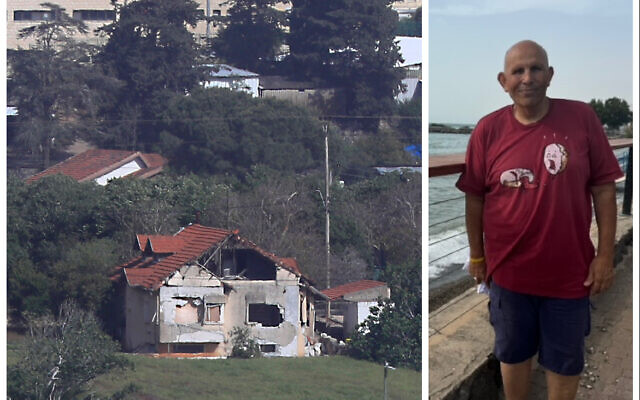
Barry Praag first laid eyes on Israel from the sea while working as a purser for P&O cruises back in the 1980s. Aged 28, he fell in love with his Israeli wife, Orit, and made aliyah, leaving his native Golders Green behind.
The couple moved to Kibbutz Dafna in the Upper Galilee 40 years ago, less than two miles from the Lebanese border, where they raised three sons. Orit had been born there and her parents were founding members. “It’s a beautiful place to raise a family with the River Dan flowing through it,” says Barry, who celebrates his 70th birthday in November. “Water is a rarity in Israel so having our own river is something special.”
The kibbutz, which recently marked its 85th anniversary, produces apples and dairy products and recently opened a hotel and food mall. “It’s a wonderful place to live and raise a family. We’ve been so happy there. But that all changed on 7 October.”
I meet Barry in his temporary home, Daria village, 40 miles south of his beloved kibbutz on the sun-drenched shores of the Galilee, during a visit organised earlier this week by the Jerusalem Press Club.
Prior to the Hamas attack in the south, and subsequent rocket fire from Hezbollah in the north, Daria was a popular family holiday resort. Now it’s exclusively home to hundreds of internally displaced Israelis like Barry and Ornit, who were told they’d likely only be gone for a few weeks. Almost eight months later their lives remain in limbo.
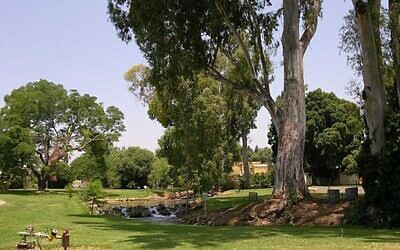
Approximately 80,000 Israelis have been evacuated from 28 northern border towns, including Metula, Nahariya, and Kiriat Shemona. Most live out of suitcases in hotels and resorts, with their housing costs covered by the government, which also provides a daily living allowance of 200 shekels (£42). The 1,100 kibbutzniks forced to flee Dafna live in eight temporary locations.
While a plan is emerging for the displaced in the south, focusing on rebuilding destroyed towns and kibbutzim, there is still no clear strategy up north. The northern region, being relatively poor compared to the rest of the country, suffers from less social cohesion and lower levels of educational attainment, adding pressure to its immediate needs. And while rocket attacks from Gaza have now slowed to a trickle, Hezbollah remains a very clear and existential threat in the north.
A makeshift school has been set up in Daria to give the children some sense of normalcy. The displaced have been told they might return home in time for the new school year in September. However, with the escalating threat of attacks from Hezbollah, which are becoming increasingly menacing, it’s uncertain how this will be possible.
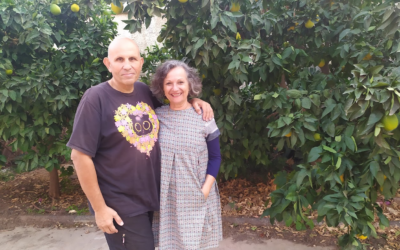
According to Sarit Zehavi of the Alma Education and Research Center, which monitors Hezbollah, the Iran-backed militia launched 1,637 attacks involving anti-tank missiles, high trajectory fire, unmanned aerial vehicles and anti-aircraft guns from northern Lebanon between October and April.
Many Israeli residents in the north are now planning to permanently move to the relative safety of central Israel.
Despite living in Israel for 40 years, Barry’s accent still carries a strong north London twang as he describes the devastating events of that October Shabbat morning. “The north was quiet, but in the evening my wife received a message that her nephew, Iftach, had been killed. He was 51 and had joined a civilian defence group in the south to confront Hamas. The army didn’t know what was going on, so local defence forces like Iftach’s, made up of former commandos, grabbed their guns and rushed to the border to defend the country.
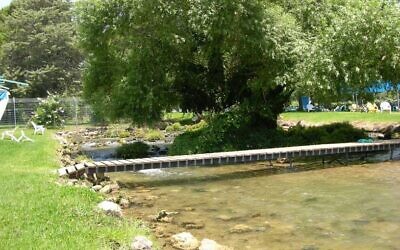
“The sight of Hamas inside Israel put the fear of God into people here in the north because we live with the daily threat of Hezbollah on our doorstep. We thought that if it could happen in the south it could only be a matter of time before we were also invaded, by an even greater threat than Hamas.
“We left on 10 October, a few days before the organised evacuation. There are now only a handful of people in Dafna. Mainly the local defence force and a few workers to keep the dairy going. We return once a week to make sure our home is secure. The kibbutz has been hit by rockets but it’s not targeted all the time. We all have a psychological barrier against returning and obviously families don’t want to expose their children to the constant trauma of sirens.”
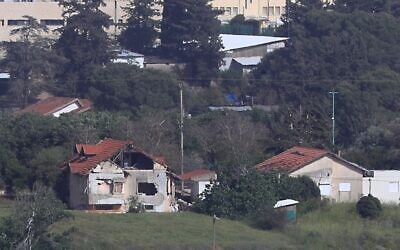
Barry’s voice tinges with regret as he reflects on living in a state of constant insecurity. “No one knows when we’re going to go back home. Before 7/10 my wife and I were vocal critics of the Netanyahu government. We went to as many demonstrations as we could. We blame the government for what’s happened. For not sensing what was going to happen and what has taken place since.
Many residents in the north are now planning to permanently move to the relative safety of central Israel.
“The army is doing the best it can. But when you’ve got people like (minister of national security) Itamar Ben-Gvir and (finance minister) Bezalel Smotrich saying they want to establish Jewish settlements inside Gaza after the war it creates even more problems for us. Who’s going to defend Ben-Gvir’s followers if they go and live in Gaza? My son?! We simply don’t know what the plan is for the day after. Never in our history have we worried about simply being here, simply living as Jews in the Jewish state. Now, under this leadership, we fear for our country’s future.”
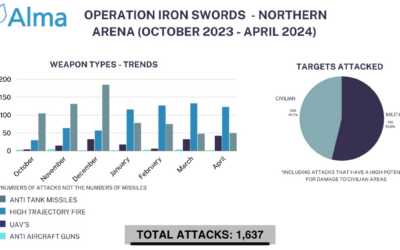
Barry leans forward in his chair and rests his chin on his left hand. He’s maintained a cheery disposition throughout our chat despite its sombre tone, but the mood suddenly shifts as he talks about Benjamin Netanyahu’s war aims and the heartrending plight of 128 hostages still held by Hamas after more than 230 days.
“I fear that by now most of them could be dead,” he frowns. “Those that are still alive must come home now. They have become part of a political game. They are meant to be half of what this war is about alongside defeating Hamas. Well, if they are so important, where are they? Why hasn’t the government done much more to get them home? In my social group we’re convinced Netanyahu is dragging this war out as much as he can for his own reasons. People are dying. Soldiers are dying. For what? Netanyahu’s career? Sometimes I wake up and think we are living in a world of insanity. That all of Israel has turned into a surreal painting in which nothing makes sense any more.”
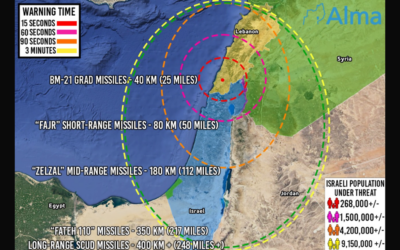

Thank you for helping to make Jewish News the leading source of news and opinion for the UK Jewish community. Today we're asking for your invaluable help to continue putting our community first in everything we do.
For as little as £5 a month you can help sustain the vital work we do in celebrating and standing up for Jewish life in Britain.
Jewish News holds our community together and keeps us connected. Like a synagogue, it’s where people turn to feel part of something bigger. It also proudly shows the rest of Britain the vibrancy and rich culture of modern Jewish life.
You can make a quick and easy one-off or monthly contribution of £5, £10, £20 or any other sum you’re comfortable with.
100% of your donation will help us continue celebrating our community, in all its dynamic diversity...
Engaging
Being a community platform means so much more than producing a newspaper and website. One of our proudest roles is media partnering with our invaluable charities to amplify the outstanding work they do to help us all.
Celebrating
There’s no shortage of oys in the world but Jewish News takes every opportunity to celebrate the joys too, through projects like Night of Heroes, 40 Under 40 and other compelling countdowns that make the community kvell with pride.
Pioneering
In the first collaboration between media outlets from different faiths, Jewish News worked with British Muslim TV and Church Times to produce a list of young activists leading the way on interfaith understanding.
Campaigning
Royal Mail issued a stamp honouring Holocaust hero Sir Nicholas Winton after a Jewish News campaign attracted more than 100,000 backers. Jewish Newsalso produces special editions of the paper highlighting pressing issues including mental health and Holocaust remembrance.
Easy access
In an age when news is readily accessible, Jewish News provides high-quality content free online and offline, removing any financial barriers to connecting people.
Voice of our community to wider society
The Jewish News team regularly appears on TV, radio and on the pages of the national press to comment on stories about the Jewish community. Easy access to the paper on the streets of London also means Jewish News provides an invaluable window into the community for the country at large.
We hope you agree all this is worth preserving.





















